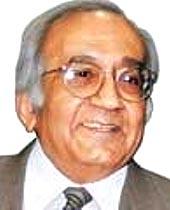For a brief while on Friday, Kirit S Parikh (chairman of the committee on oil pricing reforms) was away from his mobile phone. He came back to it to discover 80 missed calls. It was Parikh's moment in the sun, as the government accepted his committee's recommendations on deregulation of fuel prices. Speaking to Business Standard, Parikh dispelled fears of inflation and said it was more expensive if the government decided the prices. Excerpts:
 You are the man of the moment, aren't you?
You are the man of the moment, aren't you?
I am happy that the government has listened to us and accepted our logic.
Are you surprised?
Well (chuckles) if you had asked me yesterday if I expected our recommendations to be accepted, I would have said no. I am surprised and happy.
Are you also satisfied? Is this enough?
I am quite satisfied. The diesel price increase has been restricted to Rs 2 a litre for the time being. But to make these prices market-determined is a major step forward. Even with Rs 2 a litre, there will be a substantial reduction in underrecovery (by oil marketing companies). Diesel is the largest product, with more than 50 million tonnes of consumption. Forty per cent of petroleum products already have market-determined prices.
Only these four - petrol, diesel, LPG and kerosene - do not. Once you take out petrol and diesel, only kerosene and LPG remain, whose consumption is about 20 million tonnes. The amount of product subsidy will become modest.
Do you see LPG and kerosene prices being deregulated at some point?
There is some logic in subsidising LPG and kerosene. We had suggested that there should be subsidy for people below the poverty line. We hope the government targets subsidies effectively and will have the courage to free prices. Free prices are a big step towards making our energy economy competitive.
Have oil companies been calling to thank you?
No (laughs) but there have been many calls from the media. There was a brief period when I was away from my mobile phone. I came back to see 80 missed calls.
There may also be calls from those complaining about inflation.
One has to recognise that even the current policies are inflationary. No matter how you finance the underrecoveries (estimated to be about Rs 74,300 crore this financial year at old prices), there will be inflation. If the government raises taxes, it will be inflationary. Why not let the burden of inflation fall on those who directly consume the product, instead of on everyone? It is a misconception that deregulation is inflationary.
But a rise in diesel prices affects more than just the direct consumer.
Certainly! That's true! Some of this may be passed on to consumers. There may be some shift of load from trucks to railways. That may moderate some of the burden. Once you take into account the moderation, you would find that the inflation should be smaller than the inflation caused by the current policy.
Diesel is consumed by agriculture consumers as well. But they do get compensated when MSPs (minimum support price, which the government pays for foodgrain) are decided. They do take into account the impact of diesel prices. There are ways to compensate. The thing is that there are many private vehicles running on diesel.
Do you still have concerns?
Yes, I do. The government has said that it will intervene someday if there is high volatility in the international prices of crude oil. It will be nice to clearly define that level where it will intervene. That will reduce uncertainty. Otherwise, the companies might say, what if the government plays the same game again.
I don't think it is a big thing that LPG and kerosene prices have not been raised to levels recommended by us. This can be absorbed by the finance ministry and need not be an additional burden on oil companies.
Years ago, when Ram Naik was the petroleum minister, prices were revised fortnightly. But that did not last.
Yes, but in Ram Naik's time, the prices were revised but still set by the government. What we have said is that the government should not do anything and let the oil companies see what to do. Once the government decides the prices, it has to play a political drama. Has anyone measured how much of the government's time goes into this? If you put some value to it, it is very expensive.
Still, it would have taken a lot of courage on the part of the government to do this.
Yes, but it is also the most opportune time. Otherwise, before you know, elections will be all over the place. In the next few months, there is nothing. By the time elections come, people will have forgotten. That is always the case. There may be an outcry initially and petrol consumption may go down a little bit, but it always comes back to normal in three-four weeks and rises faster.